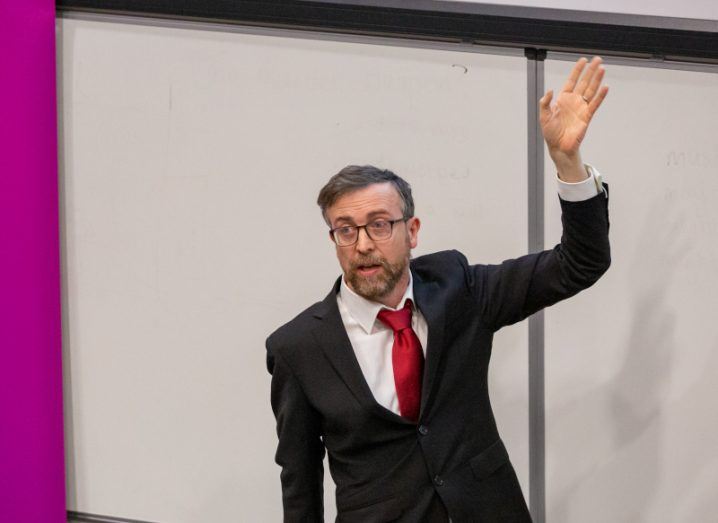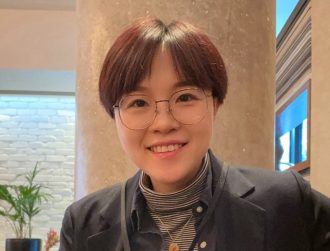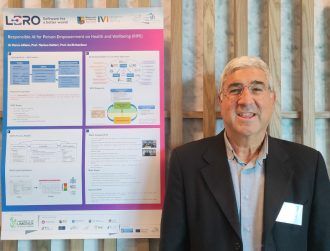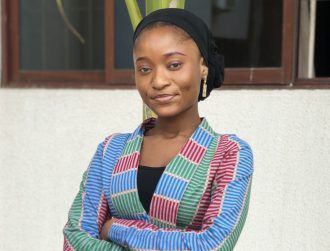
Image: Tomás Ward
Once Ireland’s first professor in data analytics, DCU’s Prof Tomás Ward explains why he thinks fear of AI is often ‘misplaced’ and why Ireland has a real opportunity to do world-class research in this area.
As the head of a research group called AI for Better Living, it’s no surprise that Prof Tomás Ward is enthusiastic about the potential of artificial intelligence (AI) technologies to improve our lives. With more than 300 scientific publications to his name, he is well placed to provide insights.
His research group studies how new AI-powered methods of sensing and interpreting physiology and behaviour can improve our understanding of human health, performance and decision-making.
Alongside his research, Ward has licensed a range of tech to industry, including sensor streaming tech for e-health, voice transcription and emotion labelling for clouds based mental health applications and edge AI.
‘Failure is an intrinsic element to the process of scientific discovery’
Tell us about your current research.
I am one of the directors of the Insight SFI Research Centre for Data Analytics, one of Europe’s largest research centres for data science. Consequently, I am involved in the oversight of numerous research projects that cover a wide range, from fundamental techniques in artificial intelligence to specific challenges in areas such as sports performance, health, psychology and sensors.
Within Insight, my personal research group is the AI for Better Living research group (AIBL). At AIBL, we focus on the development of AI for improving human health, performance and decision-making in real-world settings. I find this impact-oriented research highly motivating, and it helps attract enthusiastic researchers from diverse disciplines. These researchers bring new ideas, which in turn enhance the group.
I began my tenure at Dublin City University as Ireland’s first professor of data analytics, a position that was sponsored by Allied Irish Banks (AIB).
AIB has been supportive of me during the five years of our relationship, enabling me to invest this support in developing my team. Starting with a single PhD student, my team has grown to include, at the time of writing, 20 willing and engaged AIBL researchers.
In your opinion, why is your research important?
Research on the positive application of AI to improve our personal lives, working lives, relationships, workplaces and society is critically important and relevant to everyone.
While there is a lot of trepidation about AI, I believe much of this fear is misplaced. I am an optimist by nature, and I tend to see AI as a tool that enables us to do more with less effort, allows us to focus on the aspects of our everyday lives that we enjoy, and could help us live longer, healthier, happier lives.
Achieving this sort of outcome requires direction, thought and effort. It’s important that we invest in research to drive the outcomes we desire from such new technology.
I believe that the research I conduct, along with the broader set of related research at Insight, can help the people of Ireland attain these outcomes. We have the benefit of a critical mass of researchers capable of world-class work in this area, situated in a country where the universities are small enough to foster cross-disciplinary research. It’s the conversations across different disciplines, focused on societal grand challenges and impacts, that will yield the greatest results. We are well-positioned to achieve this in Ireland, and I think it’s important that we make the most of these opportunities.
What inspired you to become a researcher?
I have always been interested in how things work. I have always loved mysteries, puzzles and journeys of discovery since before I can remember.
Growing up the 1980s, it was BBC television shows such as Tomorrow’s World, The Sky at Night and the Horizon series that really sparked my curiosity in science and technology.
Growing up in Co Donegal, we were lucky to be able to access these TV channels (how that was done is an interesting story for another day!) and learn what we could about a world that was being transformed by breakthroughs in computing, physics and biology. I wanted to be part of that – in particular, I was curious about how technology could help us live better. This led to an interest in engineering and biomedical engineering in particular which over time evolved into my current fascination with AI and human-AI interaction.
What are some of the biggest challenges or misconceptions you face as a researcher in your field?
One of our biggest challenges we face as researchers is the public perception that science cannot fail. I understand the public perception that if taxpayers’ money is used to build infrastructure, say a bridge over a river, that the project should not fail. We all expect a well-made bridge to stay intact, and to keep doing its job for decades to come. Science, however, is high risk – it is always at the edge of failure.
Failure is an intrinsic element to the process of scientific discovery. We should expect a well-made scientific project to fail as often as it succeeds. An ambitious scientific research strategy will fund as many ‘failures’ as successes.
When I am talking about failure here, I’m talking about constructive failure, where we learn from the science and develop new hypotheses; I’m not referring to negligence or incompetence where best practices and scientific rigour are not applied. I’m talking about risks taking in terms of ideas, their exploration and development. This is the failure to embrace, it is the force that drives science and technological innovation forward. It is nothing to be feared, it is something, rather, to be expected. I often feel this is not understood outside science domains.
How do you encourage engagement with your work?
I am a huge fan of public engagement. I am one of the founders and organisers of Dublin Maker. It is a showcase of science, technology, engineering, arts and mathematics, with an emphasis on doing things.
It is focused on sharing our stories of how we make and do things. It is highly eclectic, diverse and difficult to categorise. It’s a mishmash of creativity, art and engineering.
We have held this event annually in Dublin since 2012 when Dublin was the European City of Science.
During Covid, the event was virtual and to be honest it was not the same experience at all. It is an event myself and my co-organisers love dearly and one which seems to attract many people from around Ireland.
We held the 2023 event on 2 September in Richmond Barracks in Inchicore and attracted over 10,000 attendees in one day.
I like to use this event to showcase what Irish researchers are doing – although the real emphasis is on what the Irish public are doing in terms of STEAM activities mostly at home, in their leisure time. Still, having said that, members of my AIBL group always find opportunities to showcase what they are doing there and it is a great means to really engage the public in a hands-on way.
Find out how emerging tech trends are transforming tomorrow with our new podcast, Future Human: The Series. Listen now on Spotify, on Apple or wherever you get your podcasts.







